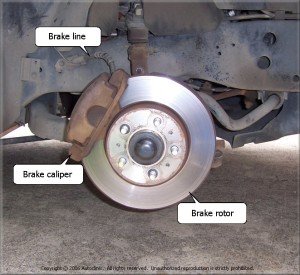Car brake problems and maintenance
Nothing stinks worse than having brake trouble and getting taken for a ride by your mechanic. Get the best information on brake repair so you do not get scammed at the workshop. The braking system is a complex system which needs proper maintenance and care over the lifetime of your car.

Before you start work, make sure you have a good repair manual. We recommend step-by-step instructions on changing your brakes. Your car’s brake system is a complex grouping of parts which serve a critical role in keeping you safe. No other system in the car is as important for your safety. Keeping your brake system in tip-top shape should be your top priority.
Common problems:
• Wear: The braking system does a lot of work and the brake pads take the brunt of the punishment. It is a good idea to have you brake pads checked every 6 months or when you suspect a problem. Symptoms include squeaking, grinding, or increased stopping distance. Most pads have a thin metal tab which vibrates against the rotor when the pads wear down to a dangerous level.
• Warped Rotors: More common in newer cars, but possible on all disc brake systems. Rotors warp due to being overheated or incorrect tightening of the wheel. A warped rotor will give a pulsing feeling when applying the brakes. This pulsing can be annoying and dangerous.
Preventive Maintenance:
1. Avoid “riding” your brakes. It’s better to slow down with moderate pressure and then releasing the brake to cool, than riding the brakes and overheating them.
2. On steep grades consider downshifting to save your brakes. Only do this when traction conditions are good.
3. Keep your wheels and braking system clean. Clean brakes work better and keep temperatures down. Use a good wheel cleaner which you know if safe for your wheel finish.
What to discuss with your mechanic:
• Some shops will try a temptation and switch or find other parts which “need” to be replaced.
• Mechanic should clean all the components of the brake system to ensure a dust and squeak free job.
• All bolts including lug nuts should have anti-seize compound on the threads to prevent them from rusting fast and causing headaches down the road.
• Have your mechanic use an anti-squeak compound on the back of the brake pads. This keeps the pads from vibrating and annoying you to no end. There is spray and paste forms, with the paste working better for me.
• Insist on seeing the pads they removed from your car. There is no use paying to replace something that doesn’t need to be replaced.
• Do you need the lifetime brake pads? Well that depends on how long you will keep the car and how many rotors you plan on buying in the next few years.
Safety is important to you and your family. Stay safe by educating yourself. When you think you have a brake problem, take it to be checked by a mechanic you trust, for your family’s sake.
Pic Src: www.autoclinix.com
Source: http://www.bob-garage.com/apps/blog/show/3128822-automotive-brakes